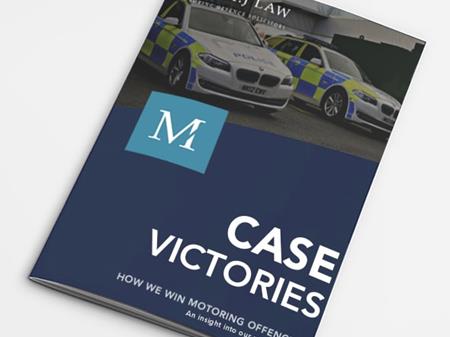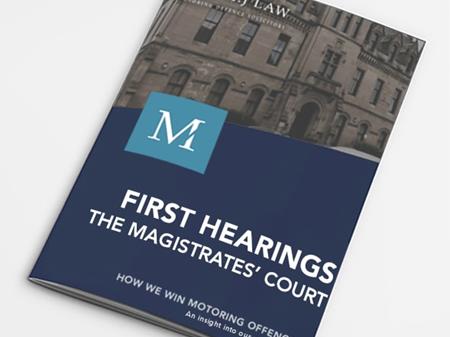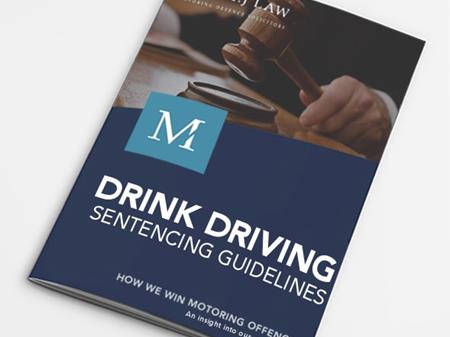
There are a number of different defences that apply to a drink driving charge. It doesn't matter how far over the legal limit you are, you can still avoid a conviction.
M.A.J Law offer free initial advice to anyone charged with drink driving. We can explain your options in detail from the outset.
You may know by now that drink driving carries a mandatory driving disqualification. This means that you will be banned if you are convicted of the offence.
Driving or attempting to drive
Triable only summarily Maximum: Unlimited fine and/or 6 months- Must endorse and disqualify for at least 12 months.
- Must disqualify for at least 2 years if offender has had two or more disqualifications for periods of 56 days or more in preceding 3 years – refer to disqualification guidance. Magistrates: consult your legal adviser for further guidance
- Must disqualify for at least 3 years if offender has been convicted of a relevant offence in preceding 10 years – consult your legal adviser for further guidance If there is a delay in sentencing after conviction, consider interim disqualification
Factors that increase seriousness
- Evidence of an unacceptable standard of driving
- Driving (or in charge of) an LGV, HGV or PSV
- Driving (or in charge of) a vehicle driven for hire or reward
Aggravating factors in Drink Driving Sentencing
- Previous convictions having regard to
a) the nature of the offence to which the conviction relates and its relevance to the current offence; and
b) the time that has elapsed since the conviction
- Location e.g. near school, residential area etc...
- Carrying passengers
- High level of traffic or pedestrians in the vicinity
- Poor road or weather conditions
The only way to avoid a driving disqualification despite being convicted is by using a special reason. A special reason will give the magistrates the discretion not to ban you. A special reason can also help you avoid community service or prison.
Drink driving first offence punishment
If you have been charged with drink driving for the first time, it's very important to consider your options and seek specialist legal advice. No doubt you're extremely worried about the prospect of going to court and the consequences of a drink driving conviction. If you're in this situation for the first time, here's what you need to know;
- Drink driving carries a mandatory minimum 12 month driving disqualification
- The court will also impose a financial penalty (in the region of 1.5x your net weekly income)
- The court can offer the Drink Driving Rehabilitation Course to reduce the length of the driving ban by 25%
- Mitigation (i.e. a sob story) is largely ineffective
- You will receive a criminal record if you plead guilty
- You may be able to avoid a conviction by defending the allegation, even if you're over the limit
FREE ADVICE? GET IN TOUCH.
Drink Driving Hardship
Bad news - there is no such thing as hardship in a drink driving case. Everyone convicted of a criminal offence in the Magistrates' Court has the right to speak. You can tell the court about your personal circumstances and the importance of your licence. Perhaps you can't work without it. Unfortunately, this will not affect the ban. To read more about mitigation in the Magistrates' Court, click here.
Unusually, your personal circumstances may actually help us win the case instead. If we challenge the allegation and plead not guilty the CPS are forced to provide full disclosure. This is an expensive and time-consuming process for the CPS, and more so in the current climate. If, as expected, the CPS fail to comply with its disclosure duties then this will weaken its case. We can then write to the CPS acknowledging its failings and invite them to discontinue the case. We can also set out your personal circumstances and explain, for example, that you need your vehicle for work, family etc... If the CPS discontinue the case, they will send us a notice of discontinuance.
Drink driving second offence punishment
If you've been convicted of drink or drug driving in the past, please seek legal advice immediately. The chance of a custodial sentence increases with every previous conviction you have. By law, the minimum driving disqualification the court can impose is three years (assuming your previous conviction falls within the last 10 years). You're also more likely to receive community penalties, like unpaid work or a curfew (house arrest).
Remember that you are entitled to plead not guilty and defend your drug driving case. To learn more about how we regularly win drink driving cases, call us for free on 01514228020.
Failing to Provide Samples for a Drink Driving Test
Failing to provide is not the same as drink driving. Under Section 7 of the Road Traffic Act 1988 a police constable can require a person to provide a sample of breath, blood or urine for analysis where they suspect that a drink driving offence has been committed. If that person refuses without reasonable excuse to provide a sample, they could be charged with failing to provide. This is an offence contrary to Section 7(6) RTA 1988 and carries a mandatory driving disqualification. In more serious cases, you can go to prison. It is not necessary for the police to prove that you were, in fact, under the influence of alcohol. They only have to prove that they had 'reasonable belief' that you were.
To read more about the defence of reasonable excuse, click here.
For more information about how to win your failing to provide case, take a look at our latest blog - Failing to provide a specimen
What happens in court for drink driving
This largely depends upon whether you have a solicitor representing you. We would always recommend a specialist solicitor because of how technical these cases can become. A 'general crime' solicitor might do a reasonably good job if you're pleading guilty. But wouldn't you like to know if you had a defence?
We would always advise having a regulated and qualified person with you in court and here's why;
- Options. A solicitor will be able to obtain the initial evidence and advise you on your options. This might include pleading guilty, not guilty or a basis of plea. If the evidence is incorrect, your solicitor may be able to force the CPS to drop the case.
- Defences. We spend a lot of time defending drink driving cases. When our clients first make contact with us, they assume they'll have to plead guilty. We are able to explain what defences apply and how likely they are to succeed. Take a look at the best drink driving defences of 2021.
- Mitigation. If you do plead guilty you will have the opportunity to raise 'mitigation'. LexisNexis defines mitigation as 'submissions made by the defendant or their representative as part of the sentencing process, presenting the information or evidence which they rely on to mitigate their role or involvement in the offence or their personal circumstances so that the judge can take this into account in sentencing'. Most people believe that mitigation is best presented by an advocate than a defendant. This is because it can come across as a 'sob story' if told by a defendant. In addition, whilst presenting mitigation it's important to understand the sentencing guidance. This way, your advocate can 'shape' your mitigation to reduce the penalty.
- Pressure. Do you know what to look for? You are always entitled to see some evidence on or before your first court hearing. The kind of evidence provided in drink driving cases is highly technical. It's made up of procedural forms and documents. If you attend court alone, you may not pick up on the mistakes with the paperwork. Solicitors are trained to identify defences quickly and use these to put pressure on the CPS. Many of our cases are dropped on or before the first hearing.
- The 'groundwork'. If you do plead not guilty, the court will want to know the reasons why. A barrister a solicitor knows how to clearly present the defence issues and arguments to the court in way which the court will understand.
You may know by now that drink driving carries a mandatory driving disqualification. This means that you will be banned if you are convicted of the offence. The only way of avoiding a driving disqualification despite being convicted is by using a special reason. The length of your driving ban depends upon your level of alcohol. So, in cases involving higher alcohol levels, the ban is longer. The minimum driving disqualification is 12 months. The court can also impose a fine, community service or custodial sentence.
Take a look at the guidelines below.
| Breath | Blood | Urine | Disqualification |
| 36 - 59 | 81 - 137 | 108 - 183 | 12 - 16 month |
| 60 - 89 | 138 - 206 | 184 - 274 | 17 - 22 month |
| 90 - 119 | 207 - 275 | 275 - 366 | 23 - 28 month |
| 120 - 150 > | 276 - 345 | 367 - 459 | 29 - 36 month |
If you have a previous drink or drug driving conviction within the past 10 years the minimum disqualification is 3 years. The Drink Driving Rehabilitation Course will reduce the length of ban by 25%.
FAQ - Drink Driving Sentencing Guidelines
-
Can I pay a higher fine to avoid a ban?
No. The fine is means tested and depends upon your income. It is usually around 100-150% of your net-weekly income. If you plead guilty at the first opportunity you would receive maximum credit on the fine. Maximum credit is one-third. Credit does not apply to the length of the disqualification. -
I'm a carer for a family member. Will the court let me keep my licence?
No. There are no provisions allowing a convicted drink driver to keep hold of their licence as a carer. Drink driving has far reaching consequences and will no doubt affect the people close to you. The court cannot take this into account when sentencing. -
My friend got a 6 month ban for the same offence. Can I get a 6 month ban?
No one can receive a 6 month ban for drink driving. The only exception is where the court finds special reasons. If you are convicted of being drunk in charge the court could impose a 6 - 12 month disqualification. This is only in the most serious drunk in charge offences. -
Will I go to prison?
Going to prison for drink driving is unlikely. Only in the most serious circumstances will a person receive a custodial sentence for drink driving. The odds are greater if a person has a relevant previous conviction or if there were serious aggravating factors.
How to get off a drink driving charge
Defend the charge
Under Article 6 of the European Convention on Human Rights everyone has the right to a fair trial. Drink driving cases take place in the Magistrates' Court. You can learn the difference between the criminal courts using the GOV.UK website. The prosecution process generally begins with the police making an arrest. Evidence is then gathered by the police to establish what actually happened and who was involved. In a drink driving case, evidence might include;
- A breath reading
- Witness statements
- An MGDDA document
Once the appropriate evidence has been gathered, the police will decide whether it is sufficient to charge the suspect. In order to charge, the police must be satisfied that there is sufficient evidence to provide a realistic prospect of conviction against the suspect. Depending on the type and seriousness of the offence committed, this decision is made by the police or the Crown Prosecution Service (CPS). If a person is charged with drink driving, they are usually released and bailed to attend the Magistrates' Court.
Prosecutors review every case they receive from the police or other investigators. Review is a continuing process and prosecutors must take account of any change in circumstances that occurs as the case develops. This includes what becomes known of the defence case, any further reasonable lines of inquiry that should be pursued, and receipt of any unused material that may undermine the prosecution case or assist the defence case, to the extent that charges should be altered or discontinued or the prosecution should not proceed. If a case is to be stopped, care should be taken when choosing the method of termination, as this can affect the victim’s position under the Victims' Right to Review scheme. Wherever possible, prosecutors should consult the investigator when considering changing the charges or stopping the case. Prosecutors and investigators work closely together, but the final responsibility for the decision whether or not a case should go ahead rests with the CPS. [CPS Code for Crown Prosecutors]
In almost all cases involving a positive alcohol test, the police will charge the suspect. A date will then be set for the suspect to attend court for a first appearance. If you have been given a date to attend court you will no doubt be extremely worried. We have produced a detailed booklet about first hearings in the Magistrates' Court. You can access this here.
There is nothing wrong with pleading not-guilty, even if you're over the legal limit. Every person has the right to challenge an allegation made by the police and to check the evidence against them. Not only can you continue to drive for 2 - 6 months, you will also see the full case file held by the CPS, including any witness statements and the MGDDA document. It is only by checking the evidence can you find fault with it.
Last week we looked at the best drink driving defence of 2020.
Thinking of pleading guilty?
Our Case Studies take a look a real cases involving real people. You may also be interested in reading about court hearings in the Magistrates' Court and Sentencing Guidelines. You can also view our case studies page for more information.

A Summary of Recent Cases – Marcus A Johnstone
How to win the 'unwinnable' cases...

Drink Driving – Your First Court Hearing
This booklet discusses a drink driving first court hearing - Is a solicitor necessary?

Will you go to prison?
This booklet looks at the Magistrates' Court Sentencing Guidelines for drink driving
Prosecution Disclosure
If you read our blogs regularly you will know that we speak often about the affect of prosecution disclosure (or lack of) in criminal cases. Under the Criminal Procedure and Investigations Act 1988 the CPS have a duty to provide you with;
- The evidence is wants to use against you
- A schedule of unused material
This disclosure should be served as soon as possible following a not guilty plea in the Magistrates' Court and usually within 28 days of the first hearing. But what happens if the CPS fail to provide disclosure within the permitted timeframe?
A failure by the CPS to provide disclosure is one of the most common ways that we win drink and drug driving cases. This is because rules of evidence require the CPS to serve its evidence prior to trial. Often due to staff shortages and administration problems the CPS miss deadlines and make silly mistakes. This is a common occurrence in Magistrates' Court cases, usually because drink driving cases are less serious than other offences in higher courts.
Unfortunately it's not as simple as sitting back and letting the CPS slip up. The defence are required to be proactive in contacting the CPS and in some circumstances are required to call the case back to court for a pretrial review. As an experienced team of specialist defence solicitors, we can advise you on all of these issues. We know how to best safeguard your position in order to give you the best chance of winning your drink driving case.
Special Reasons
A special reason is not the same as a defence. In other words, you can't defend the case using a special reason. Curiously, a special reason is not the same as mitigation either. Most defendants have some kind of mitigation to put forward (i.e. if I licence my job I'll lose my job), but not everyone has a special reason. The most common special reason arguments are discussed in our latest video. You can view this below.
Next Steps: Please get in touch to discuss your case with a member of our team. You can use the contact form below or call 01514228020 for free initial advice. You can also use our drink driving ban calculator or check out our video series.



